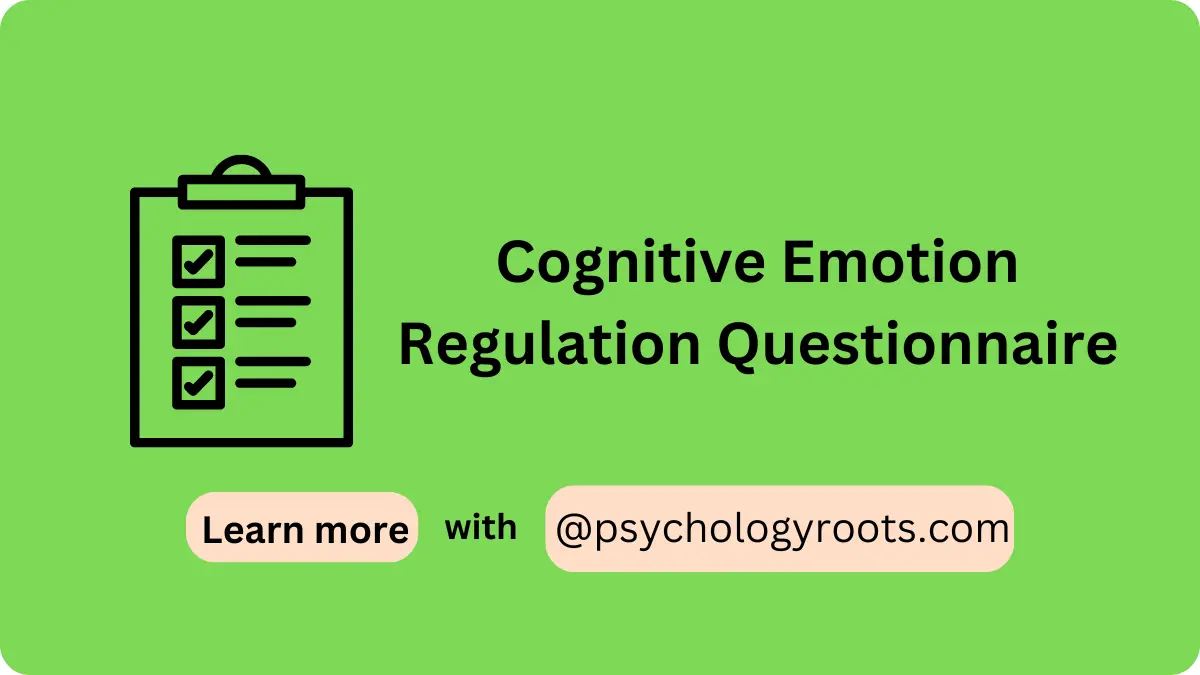Table of Contents
Cognitive Emotion Regulation Questionnaire
Here in this post, we are sharing the “Cognitive Emotion Regulation Questionnaire”. You can read psychometric and Author information. We have thousands of Scales and questionnaires in our collection (See Scales and Questionnaires). You can demand us any scale and questionnaires related to psychology through our community, and we will provide you with a short time. Keep visiting Psychology Roots.
About Cognitive Emotion Regulation Questionnaire
Scale Name
Cognitive Emotion Regulation Questionnaire
Author Details
Garnefski, N., & Kraaij
Translation Availability
Not Sure

Background/Description
The Cognitive Emotion Regulation Questionnaire (CERQ) is a self-report tool developed by Garnefski and Kraaij in 2007 to assess cognitive coping strategies people use in response to negative life events or stressful situations. Unlike other emotional regulation questionnaires, the CERQ focuses specifically on cognitive strategies, distinguishing between more adaptive and maladaptive responses.
This tool is used to evaluate how individuals manage their emotions through thoughts in both clinical and non-clinical populations. It is widely applied in psychological research, especially in studies related to mental health, stress management, emotional regulation, and coping mechanisms.
The CERQ includes several cognitive strategies that are grouped into two categories: adaptive strategies such as positive reappraisal and planning, and maladaptive strategies such as catastrophizing and self-blame.
Purpose:
The CERQ is commonly used in therapeutic contexts to identify which cognitive strategies a person uses and how these strategies may contribute to psychological well-being or distress. It also serves as a diagnostic tool to better understand the cognitive patterns that underlie emotional regulation, particularly in individuals with depression, anxiety, and other mood disorders.
Administration, Scoring and Interpretation
- Format: The Cognitive Emotion Regulation Questionnaire consists of 36 items, divided into 9 subscales. Each subscale represents a specific cognitive emotion regulation strategy:
- Self-Blame
- Acceptance
- Rumination
- Positive Refocusing
- Refocus on Planning
- Positive Reappraisal
- Putting into Perspective
- Catastrophizing
- Other-Blame
- Respondents rate each item on a 5-point Likert scale ranging from 1 (almost never) to 5 (almost always) based on how often they use each strategy.
- Respondents: The CERQ is suitable for individuals aged 12 and above and can be used in both clinical and non-clinical settings. It is typically administered to assess how people cognitively cope with stressful or negative situations.
Reliability and Validity
The Cognitive Emotion Regulation Questionnaire has demonstrated strong psychometric properties, including high internal consistency for the subscales. It has been validated in various populations and translated into multiple languages. Numerous studies have confirmed the construct validity of the CERQ, linking the use of adaptive strategies to better psychological outcomes and maladaptive strategies to poorer emotional health.
Available Versions
36-Items
Reference
Garnefski, N., & Kraaij, V. (2007). The cognitive emotion regulation questionnaire. European journal of psychological assessment, 23(3), 141-149.
Important Link
Scale File:
Frequently Asked Questions
What does the CERQ measure?
The CERQ measures nine cognitive emotion regulation strategies individuals use to manage stressful or negative life events.
How many items are included in the CERQ?
The CERQ includes 36 items, divided into 9 subscales.
What is the response format for the CERQ?
The items are rated on a 5-point Likert scale from 1 (almost never) to 5 (almost always).
Who can use the CERQ?
The CERQ is suitable for individuals aged 12 and above in both clinical and non-clinical settings.
What are the two categories of cognitive strategies in the CERQ?
The CERQ divides cognitive strategies into adaptive strategies (e.g., positive reappraisal, planning) and maladaptive strategies (e.g., catastrophizing, self-blame).
Disclaimer
Please note that Psychology Roots does not have the right to grant permission for the use of any psychological scales or assessments listed on its website. To use any scale or assessment, you must obtain permission directly from the author or translator of the tool. Psychology Roots provides information about various tools and their administration procedures, but it is your responsibility to obtain proper permissions before using any scale or assessment. If you need further information about an author’s contact details, please submit a query to the Psychology Roots team.
Help Us Improve This Article
Have you discovered an inaccuracy? We put out great effort to give accurate and scientifically trustworthy information to our readers. Please notify us if you discover any typographical or grammatical errors.
Make a comment. We acknowledge and appreciate your efforts.
Share With Us
If you have any scale or any material related to psychology kindly share it with us at psychologyroots@gmail.com. We help others on behalf of you.